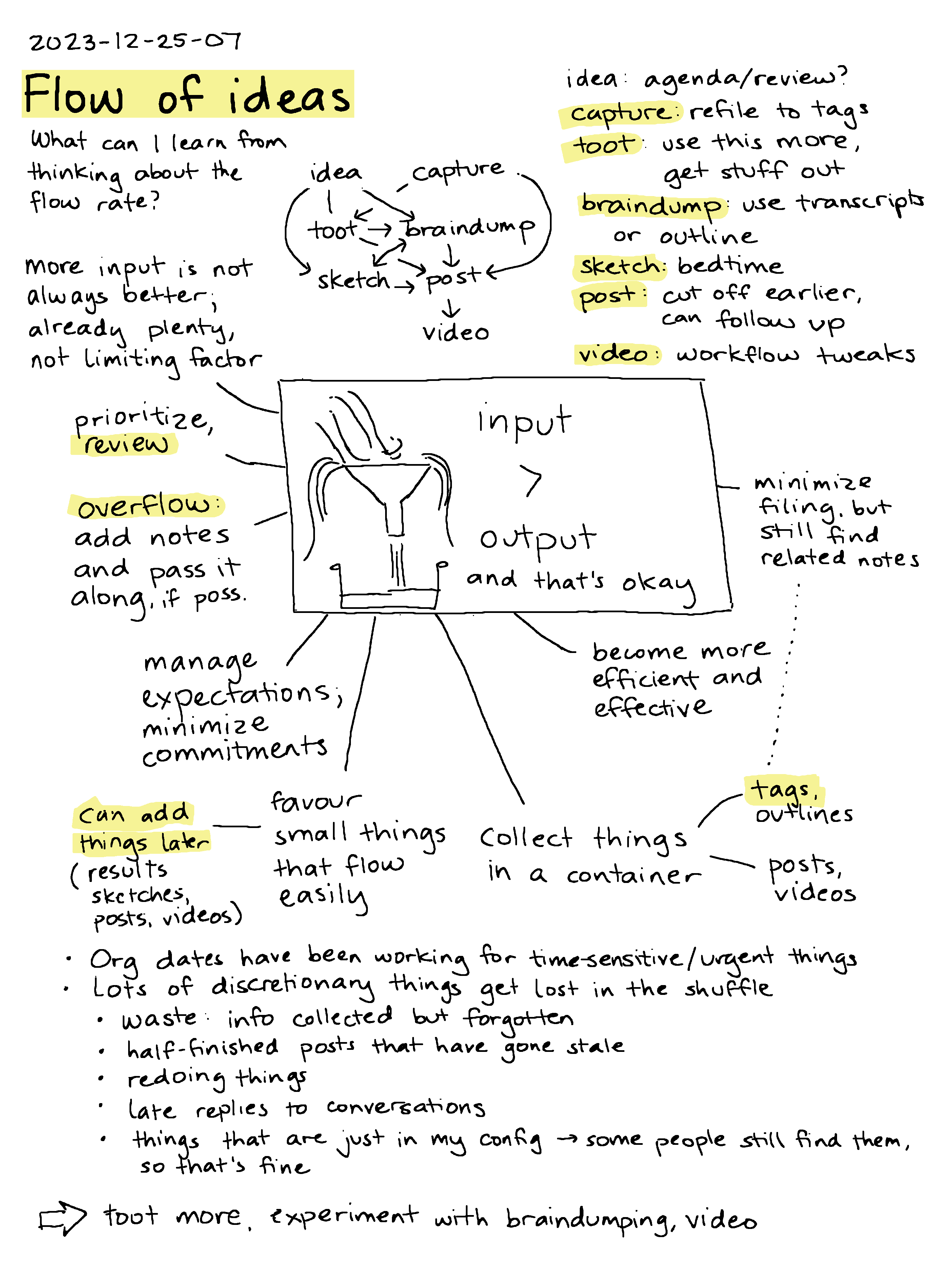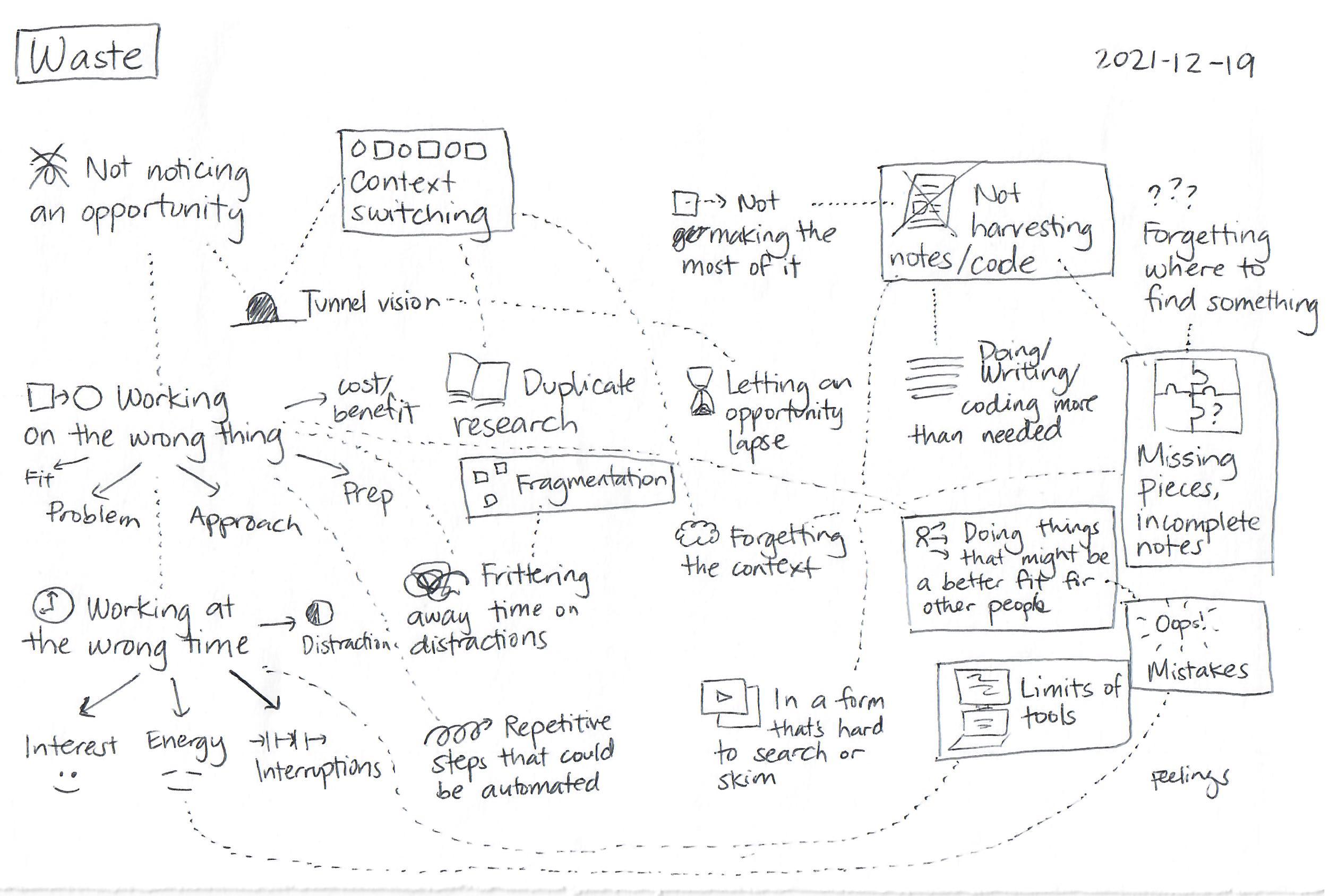Working with the flow of ideas
| speechtotext, metaphor, life, blogging, writing, kaizen
Text from sketch
2023-12-25-07
Flow of ideas
What can I learn from thinking about the flow rate?
input > output, and that's okay
Parts:
- idea: agenda/review?
- capture: refile to tags
- toot: use this more, get stuff out
- braindump: use transcripts or outline
- sketch: bedtime
- post: cut off earlier, can follow up
- video: workflow tweaks
Thoughts:
- more input is not always better; already plenty, not limiting factor
- prioritize, review
- overflow: add notes and pass it along, if poss.
- can add things later (results, sketches, posts, videos)
- manage expectations; minimize commitments
- favour small things that flow easily
- collect things in a container
- tags, outlines
- posts, videos
- minimize filing, but still find related notes
- become more efficient and effective
The heap:
- Org dates have been working for time-sensitive/urgent things
- Lots of discretionary things get lost in the shuffle
- waste info collected but forgotten
- half-finished posts that have gone stale
- redoing things
- late replies to conversations
- things that are just in my config - some people still find them, so that's fine
Next: toot more experiment with braindumping, video
I come up with way more ideas than I can work on, and that's okay. That's good. It means I can always skim the top for interesting things, and it's fine if things overflow as long as the important stuff stays in the funnel. I'm experimenting with more ways to keep things flowing.
I usually come up with lots of ideas and then revisit my priorities to see if I can figure out 1-3 things I'd like to work on for my next focused time sessions. These priorities are actually pretty stable for the most part, but sometimes an idea jumps the queue and that's okay.
There's a loose net of projects/tasks that I'm currently working on and things I'm currently interested in, so I want to connect ideas and resources to those if I can. If they aren't connected, or if they're low-priority and I probably won't get to them any time soon, it can make a lot of sense to add quick notes and pass it along.
For things I want to think about some more, my audio braindumping workflow seems to be working out as a way to capture lots of text even when I'm away from my computer. I also have a bit more time to sketch while waiting for the kiddo to get ready for bed. I can use the sketchnotes as outlines to talk through while I braindump, and I can take my braindumps and distill them into sketches. Then I can take those and put them into blog posts. Instead of getting tempted to add more and more to a blog post (just one more idea, really!), I can try wrapping up earlier since I can always add a follow-up post. For some things, making a video might be worthwhile, so smoothing out my workflow for creating a video could be useful. I don't want to spend a lot of time filing but I still want to be able to find related notes, so automatically refiling based on tags (or possibly suggesting refile targets based on vector similarity?) might help me shift things out of my inbox.
I'm generally not bothered by the waste of coming up with ideas that I don't get around to, since it's more like daydreaming or fun. I sometimes get a little frustrated when I want to find an interesting resource I remember coming across some time ago and I can't find it with the words I'm looking for. Building more of a habit of capturing interesting resources in my Org files and using my own words in the notes will help while I wait for personal search engines to get better. I'm a little slow when it comes to e-mails because I tend to wait until I'm at my computer–and then when I'm at my computer, I prefer to tinker or write. I occasionally redo things because I didn't have notes from the previous solution or I couldn't find my notes. That's fine too. I can get better at taking notes and finding them.
So I think some next steps for me are:
- Post more toots on @sachac@emacs.ch; might be useful as a firehose for ideas. Share them back to my Org file so I have a link to the discussion (if any). Could be a quick way to see if anyone already knows of related packages/code or if anyone might have the same itch.
- See if I can improve my braindumping/sketch workflow so that I can flesh out more ideas
- Tweak my video process gradually so that I can include more screenshots and maybe eventually longer explanations


